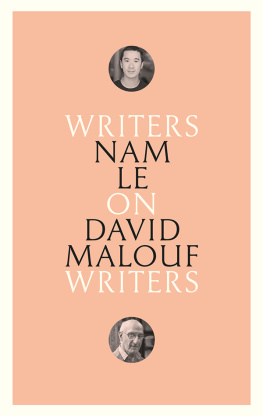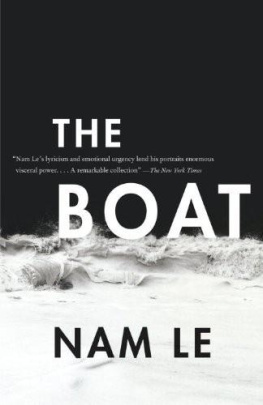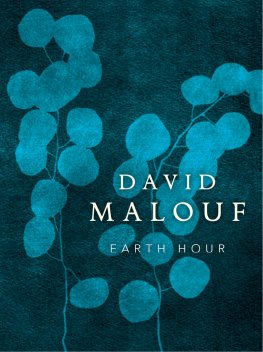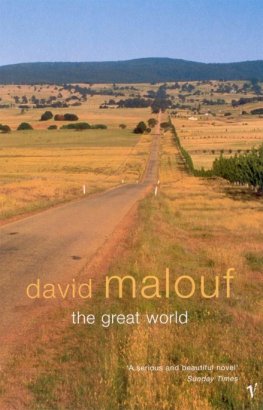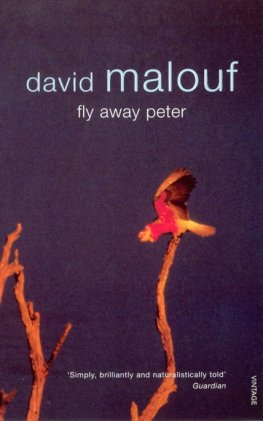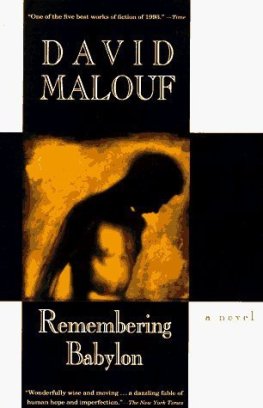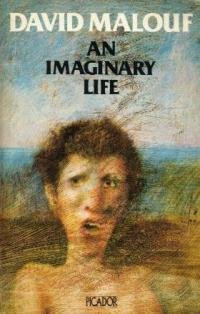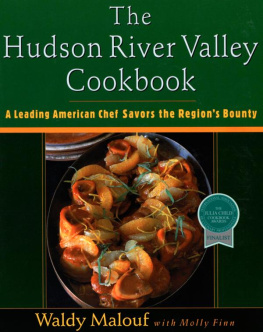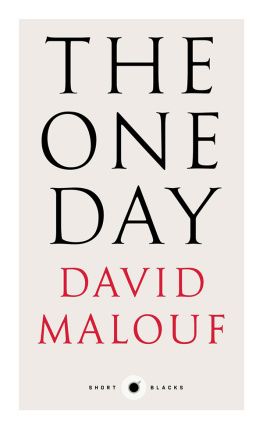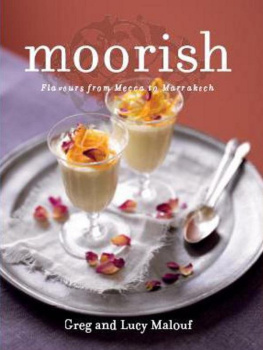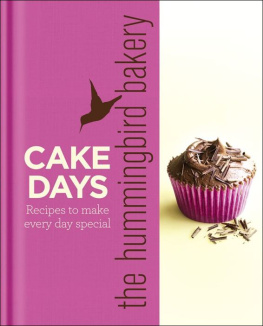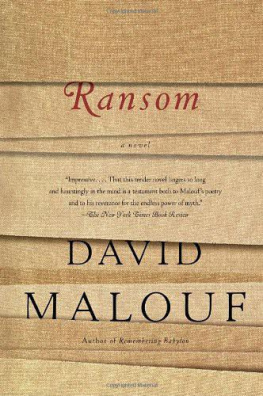Nam Le - On David Malouf
Here you can read online Nam Le - On David Malouf full text of the book (entire story) in english for free. Download pdf and epub, get meaning, cover and reviews about this ebook. City: VICTORIA, year: 2019, publisher: BLACK INC, genre: Non-fiction / History. Description of the work, (preface) as well as reviews are available. Best literature library LitArk.com created for fans of good reading and offers a wide selection of genres:
Romance novel
Science fiction
Adventure
Detective
Science
History
Home and family
Prose
Art
Politics
Computer
Non-fiction
Religion
Business
Children
Humor
Choose a favorite category and find really read worthwhile books. Enjoy immersion in the world of imagination, feel the emotions of the characters or learn something new for yourself, make an fascinating discovery.
- Book:On David Malouf
- Author:
- Publisher:BLACK INC
- Genre:
- Year:2019
- City:VICTORIA
- Rating:5 / 5
- Favourites:Add to favourites
- Your mark:
- 100
- 1
- 2
- 3
- 4
- 5
On David Malouf: summary, description and annotation
We offer to read an annotation, description, summary or preface (depends on what the author of the book "On David Malouf" wrote himself). If you haven't found the necessary information about the book — write in the comments, we will try to find it.
On David Malouf — read online for free the complete book (whole text) full work
Below is the text of the book, divided by pages. System saving the place of the last page read, allows you to conveniently read the book "On David Malouf" online for free, without having to search again every time where you left off. Put a bookmark, and you can go to the page where you finished reading at any time.
Font size:
Interval:
Bookmark:
Published in partnership with
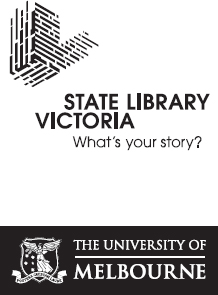

Published by Black Inc.
in association with the University of Melbourne and State Library Victoria.
Black Inc., an imprint of Schwartz Publishing Pty Ltd
Level 1, 221 Drummond Street, Carlton Victoria 3053 Australia
State Library Victoria
328 Swanston Street, Melbourne Victoria 3000 Australia
www.slv.vic.gov.au
The University of Melbourne
Parkville Victoria 3010 Australia
www.unimelb.edu.au
Copyright Nam Le 2019
Nam Le asserts his right to be known as the author of this work.
ALL RIGHTS RESERVED.
No part of this publication may be reproduced, stored in a retrieval system, or transmitted in any form by any means electronic, mechanical, photocopying, recording or otherwise without the prior consent of the publishers. Extract from Kenneth Slessors South Country (Selected Poems, 2014) reprinted by permission of HarperCollins Australia. Every effort has been made to contact the copyright holders of material in this book. However, where an omission has occurred, the publisher will gladly include acknowledgement in any future edition.
9781760640392 (hardback)
9781743820926 (ebook)

Cover design by Peter Long and Akiko Chan
Typesetting by Akiko Chan
Photograph of Nam Le: Dave Tacon
Photograph of David Malouf: Dominic Lorrimer/Fairfax Media
For Ch
PRIME
S trange, that I remember only the mornings. Or maybe it was all a single morning, all those high school years dark chill runny-nosed morning, shock of school uniform starch against the skin. Kerbs and platforms, buses and trains and trams and traffic lights. I was a scholarship kid and never felt like I belonged there and maybe I made sure to make it so blocked myself out till pretty much insensible. Melbourne Grammar (19911996) was bluestone shadow, navy blue and paler blue recurring, faces floating against rain and a sort of drowned light. It was sports fields gone green and wet, galleys of wooden desks and the always reverberant voice in those woodfilled rooms calling Anyone? Anyone at all?, naming names Sibree, Hooper, Dinning, Frye, Downing fathers names, patriarchs names. The light that light of air just after rain. Classrooms full of wood and plastered drywalls, nylon charts and corked pinboards and washed and chalk-clotted blackboards, all barely masking the cold, sounding, ancient stone beneath. That was high school. Mood dream, time tolled through the body.
But dreams are multi-registral. They can be all mood and still take in all sorts of other stuff. They admit whatever comes to mind. My mind at the time was mucked up: by hormones, by classroom codes, by inchoate insecurities and ambitions, by the disjunctions language, ethics, expectation, allegiance between school and home. Nothing was given. What was home, anyway, and what away? What I knew was this: I was most at home when reading, when being taken away by words.
I read in English. (Both tenses apply.) For a while there I read mostly poetry, which seemed to ratify or at least dignify my outsized feelings. School, as everyone knows, is where books go to get sterilised, so I was lucky to have English teachers who let me read outside the curriculum. Palgrave and Norton were my boon companions. Human-wise, my best friend was Ch, a bawdy, brainy country boy whod managed to land a spectacular triple scholarship (tuition, music, boarding). He played piano. I read poetry, and then I wrote it, and then he read it. He was my first real reader by which I mean he proclaimed my talent as amongst the brightest that had ever blazed across our or any firmament. We were big on ranking talent, on absorbing and contriving distinctions. Yeats over Keats, Rilke over Rimbaud. Hopkins over Donne, but only just. We argued intensely and violently when I said Tennyson and he Blake. Or maybe it was the other way around. We were very serious; we persuaded our Lit teacher to accept a joint essay qua duet: Ch at the grand piano in the gym riffing off Ravel and Berg while I stood alongside, reciting rip-offs of Eliot and Pound.
We were not popular.
What wed realised, though, was there could be agency in exclusion. If we were going to be outsiders, we would decide outside what. To hell with friendship groups stretching back twelve years plus, to family alums and fundraising networks, homes in Toorak and holidays in Noosa, to mens eights and first elevens and eighteens instead, we would camp on the periphery of ye olde haute culture, importuning ourselves upon its canons and classics.
This, of course, was (is) classic cringe. A condition of always choosing the other side. Putting yourself on the wrong side. But so we chose. The dead over the living. The old over the new. The white over the coloured. The European over the Antipodean, the international over the Australian. Always the proscribed over the prescribed (or, in one of Englishs archest contronyms and how couldnt you love this language? the sanctioned over the sanctioned). At the time, post-Bicentennial, there was a grand push to triumphalise Australian literature, so even as we submitted to the Ozlit foisted on us at school, we saw those books for what they were: scabs, labouring to shore up the shibboleths of shoddy nationalism. We scorned them. They were substandard. They were, to use perhaps the most cutting put-down of our schoolboy sociolect, try-hard.
And then we got where we were going. Assigned via VCE reading list: Remembering Babylon, David Malouf. An Australian book about Australian settlement by an Australian author. And here, of course, is where Ive been going. This sleek, slim book readable in an afternoon was good. Not a whiff of affirmative action. It shook our snobberies: here was a very-much-alive half-Lebanese writer (from provincial Brisbane, no less) producing English-language writing of the very first order. (We spoke like this.) And in prose, not poetry. The poetry was in the prose; it stayed and sprung its rhythms, chorded its ideas, concentrated its images. Every other novel claims to be written in poetic prose; the real thing, when you come across it, is actually shocking. It torques your reading brain (neuroimaging confirms this), drafts your breath, excites and exhausts your eye and ear. Its as taxing as it is exultative. Remembering Babylon, while being syllabus-bait for its Big Ideas, was acutely for me a sentence-level novel.
What does this mean? Isnt any novel (and its evoked ideas) only and always made of sentences? Yes and yes but only a writer attuned to the molecular level of syllable and sound can understand how profoundly ideas inhere in their inspiriting expressions. See, e.g., the books last paragraph:
It glows in fullness till the tide is high and the light almost, but not quite, unbearable, as the moon plucks at our world and all the waters of the earth ache towards it, and the light, running in fast now, reaches the edges of the shore, just so far in its order, and all the muddy margin of the bay is alive, and in a line of running fire all the outline of the vast continent appears, in touch now with its other life.
Critics have maligned this passage for its transcendentalism, but who could deny its grace? Its ambition of register the biblically inflected tone and parataxis; the gorgeous mimesis of its tidal ebb or its register of ambition the cosmic, vatic scope of its concern, fast erupting through space and time? The subject is light and light lies all through it. Reading this for the first time, Ch and I, as propensely hostile as we were, couldnt but cede. Here was language that drew meaning out of music, of echo, silence. That communicated before it meant. Here was lyricism that neither beat up nor blenched at the sublime but treated it as a necessary aspect of ordinary life. Most of all, here was a confidence that seemed to flex its way serenely through any niggles of cringe.
Next pageFont size:
Interval:
Bookmark:
Similar books «On David Malouf»
Look at similar books to On David Malouf. We have selected literature similar in name and meaning in the hope of providing readers with more options to find new, interesting, not yet read works.
Discussion, reviews of the book On David Malouf and just readers' own opinions. Leave your comments, write what you think about the work, its meaning or the main characters. Specify what exactly you liked and what you didn't like, and why you think so.

